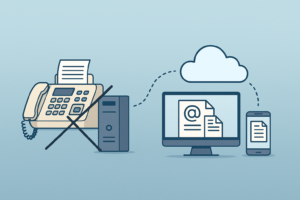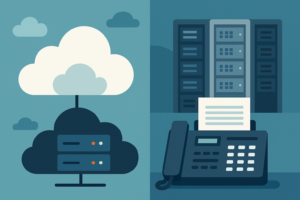Faxing is still as useful a technology as it ever was. It provides a secure means for sensitive documents to be transmitted – something that most every organization has to do at some point. One industry that still sees faxes by regulation is healthcare. But it it seems as though these solutions are beginning to show their age, running up costs and not providing significant enough ROI. Yet its use remains critical to healthcare communications.
"The initial investment may have been substantial, but set that aside and consider the monthly overhead for maintaining these systems: They require maintenance, support, power, facilities, and if they fail, it could have a major negative impact to your healthcare organization," wrote EHR Intelligence contributor Michael Harris. "The ongoing operating costs typically go beyond annual maintenance and support fees and include productivity losses that can be a hidden drain."
The solution that Harris provides is the one that is commonly being accepted these days: cloud-based faxing. Like voice, fax is still a required channel for many, but its historic lack of integration with other telecom platforms has caused a rift in its relationship with users. But now that it is being pushed into an IP-defined environment, faxing is continuing to demonstrate its worth as a necessary asset.
Getting with the times
The world is moving increasingly paperless. While filing systems used to be physical in nature, the ever-increasing use of computers and mobile devices has negated much of their need, with everything instead being stored digitally. This is presenting a growing problem for faxes. Documents essentially need to be printed out, sent via fax, received and then scanned back into another computer so that they can be properly cataloged. By modern standards, this is almost archaic in nature.
This is why cloud-based fax is proving to be so popular. Missives can be sent and received not only by traditional fax machines, but also through app-defined environments and – when applicable – email accounts. The real advantage here is that copies of the fax can automatically be cataloged in the cloud while also reaching every party that needs them in a timely manner.
"Hosted fax services replace fax servers for healthcare providers with varying fax volumes and remote staff," Harris wrote. "Employees can be assigned their own fax number that is often linked to their email address, allowing them to send or receive faxes as email attachments anywhere that they have internet access. Hosted services can also be set up to provide secure transmissions, usually via encrypted Transport Layer Security (TLS) between users and cloud-based servers to address HIPAA compliance issues."
Security counts
For healthcare institutions – hospitals, pharmacists, etc. – these kinds of fax services are especially useful. Email was, in theory, supposed to be a substitute for fax. But the channel's inherent weaknesses have left it unacceptable for many issues involving patient records. The loss of such files could be incredibly damaging not only to their subject, but to the entities that were not supposed to let them slip out.
Cloud faxing is not only more secure than email, but it is even considered more secure than legacy fax server systems. When considering this along with the incredible functionality and possibilities this channel possesses, cloud fax seems to be the answer for healthcare facilitates that wish to bring their communications into the 21st century.
"Retiring your fax servers gets you out of the fax technology management business and allows you to focus on your organization's core processes," Harris wrote. "What technology replaces fax servers while delivering the same solution? Hosted fax services."




